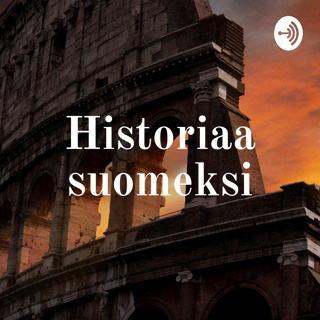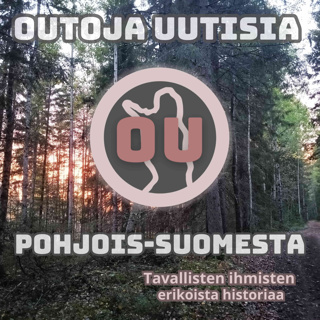
Gerard Manley Hopkins
Melvyn Bragg and guests discuss the life and works of Hopkins (1844-89), a Jesuit priest who at times burned his poems and at others insisted they should not be published. His main themes are how he, nature and God relate to each other. His friend Robert Bridges preserved Hopkins' poetry and, once printed in 1918, works such as The Windhover, Pied Beauty and As Kingfishers Catch Fire were celebrated for their inventiveness and he was seen as a major poet, perhaps the greatest of the Victorian age. WithCatherine Phillips R J Owens Fellow in English at Downing College, University of CambridgeJane Wright Senior Lecturer in English Literature at the University of Bristoland Martin Dubois Assistant Professor in Nineteenth Century Literature at Durham UniversityProducer: Simon Tillotson
21 Maalis 201947min

Authenticity
Melvyn Bragg and guests discuss what it means to be oneself, a question explored by philosophers from Aristotle to the present day, including St Augustine, Kierkegaard, Heidegger and Sartre. In Hamlet, Polonius said 'To thine own self be true', but what is the self, and what does it mean to be true to it, and why should you be true? To Polonius, if you are true to yourself, ‘thou canst not be false to any man’ - but with the rise of the individual, authenticity became a goal in itself, regardless of how that affected others. Is authenticity about creating yourself throughout your life, or fulfilling the potential with which you were born, connecting with your inner child, or something else entirely? What are the risks to society if people value authenticity more than morality - that is, if the two are incompatible? The image above is of Sartre, aged 8 months, perhaps still connected to his inner child.With Sarah Richmond Associate Professor in Philosophy at University College LondonDenis McManus Professor of Philosophy at the University of Southamptonand Irene McMullin Senior Lecturer in Philosophy at the University of EssexProducer: Simon Tillotson
14 Maalis 201950min

William Cecil
Melvyn Bragg and guests discuss the impact on the British Isles of William Cecil, 1st Baron Burghley, the most poweful man in the court of Elizabeth I. He was both praised and attacked for his flexibility, adapting to the reigns of Protestant and Catholic monarchs and, under Elizabeth, his goal was to make England strong, stable and secure from attack from its neighbours. He sought control over Ireland and persuaded Elizabeth that Mary Queen of Scots must die, yet often counselled peace rather than war in the interests of prosperity. With Diarmaid MacCulloch Professor of the History of the Church at the University of OxfordSusan Doran Professor of Early Modern British History at the University of Oxfordand John Guy Fellow of Clare College, University of CambridgeProducer: Simon Tillotson
7 Maalis 201951min

Antarah ibn Shaddad
Melvyn Bragg and guests discuss the life, works, context and legacy of Antarah (525-608AD), the great poet and warrior. According to legend, he was born a slave; his mother was an Ethiopian slave, his father an elite Arab cavalryman. Antarah won his freedom in battle and loved a woman called Abla who refused him, and they were later celebrated in the saga of Antar and Abla. One of Antarah's poems was so esteemed in pre-Islamic Arabia that it is believed it was hung up on the wall of the Kaaba in Mecca. With James Montgomery Sir Thomas Adams's Professor of Arabic at the University of CambridgeMarlé Hammond Senior Lecturer in Arabic Popular Literature and Culture at SOAS, University of LondonAnd Harry Munt Lecturer in Medieval History at the University of YorkProducer: Simon Tillotson
28 Helmi 201949min

Pheromones
Melvyn Bragg and guests discuss how members of the same species send each other invisible chemical signals to influence the way they behave. Pheromones are used by species across the animal kingdom in a variety of ways, such as laying trails to be followed, to raise the alarm, to scatter from predators, to signal dominance and to enhance attractiveness and, in honey bees, even direct development into queen or worker. The image above is of male and female ladybirds that have clustered together in response to pheromones. With Tristram Wyatt Senior Research Fellow at the Department of Zoology at the University of OxfordJane Hurst William Prescott Professor of Animal Science at the University of Liverpooland Francis Ratnieks Professor of Apiculture and Head of the Laboratory of Apiculture and Social Insects at the University of SussexProducer: Simon Tillotson
21 Helmi 201949min

Judith beheading Holofernes
Melvyn Bragg and guests discuss how artists from the Middle Ages onwards have been inspired by the Bible story of the widow who killed an Assyrian general who was besieging her village, and so saved her people from his army and from his master Nebuchadnezzar. A symbol of a woman's power and the defiance of political tyranny, the image of Judith has been sculpted by Donatello, painted on the ceiling of the Sistine Chapel and, in the case of Caravaggio, Liss and Artemisia Gentileschi, been shown with vivid, disturbing detail. What do these interpretations reveal of the attitudes to power and women in their time, and of the artists' own experiences? The image of Judith, above is from a tapestry in the Duomo, Milan, by Giovanni or Nicola Carcher, 1555With Susan Foister Curator of Early Netherlandish, German and British Painting at the National GalleryJohn Gash Senior Lecturer in History of Art at the University of AberdeenAnd Ela Nutu Hall Research Associate at the Sheffield Institute for Interdisciplinary Biblical Studies, at the University of SheffieldProducer: Simon Tillotson
14 Helmi 201949min

Aristotle's Biology
Melvyn Bragg and guests discuss the remarkable achievement of Aristotle (384-322BC) in the realm of biological investigation, for which he has been called the originator of the scientific study of life. Known mainly as a philosopher and the tutor for Alexander the Great, who reportedly sent him animal specimens from his conquests, Aristotle examined a wide range of life forms while by the Sea of Marmara and then on the island of Lesbos. Some ideas, such as the the spontaneous generation of flies, did not survive later scrutiny, yet his influence was extraordinary and his work was unequalled until the early modern period.The image above is of the egg and embryo of a dogfish, one of the animals Aristotle described accurately as he recorded their development.WithArmand Leroi Professor of Evolutionary Development Biology at Imperial College LondonMyrto Hatzimichali Lecturer in Classics at the University of CambridgeAndSophia Connell Lecturer in Philosophy at Birkbeck, University of LondonProducer: Simon Tillotson
7 Helmi 201950min

Owain Glyndwr
Melvyn Bragg and guests discuss the life of the Welsh nobleman, also known as Owen Glendower, who began a revolt against Henry IV in 1400 which was at first very successful. Glyndwr (c1359-c1415) adopted the title Prince of Wales and established a parliament and his own foreign policy, until he was defeated by the future Henry V. Owain Glyndwr escaped and led guerilla attacks for several years but was never betrayed to the English, disappearing without trace.With Huw Pryce Professor of Welsh History at Bangor UniversityHelen Fulton Professor of Medieval Literature at the University of BristolChris Given-Wilson Emeritus Professor of Medieval History at the University of St AndrewsProducer: Simon Tillotson
31 Tammi 201948min






















